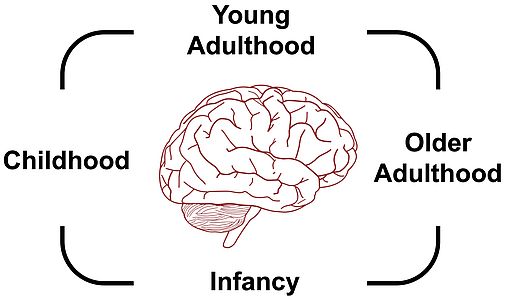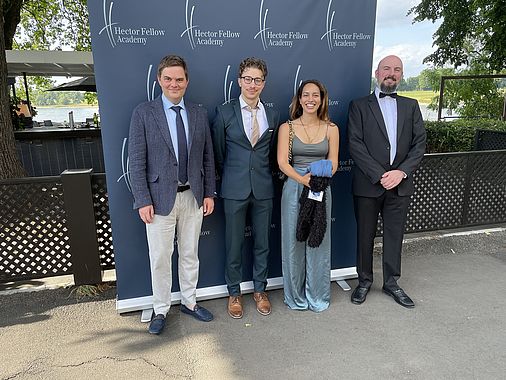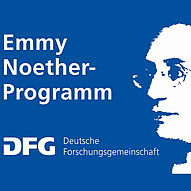
Emmy Noether Group

Welcome to the homepage of the Emmy Noether Group
We are a team of psychologists and cognitive neuroscientists trying to understand how and why mechanisms of learning and brain plasticity change over the lifespan. Please browse this website for more information. If you are interested in our work, please send an email to the group leader (sebastian1.frank@psychologie.uni-regensburg.de).
News
01/2026: New publications
This paper, now published as a peer-reviewed preprint in eLife, investigates how GABAergic processing in parietal cortex contributes to goal-directed visual information processing.
Wang Z, Wiborg S, Wittmann A, Beck N, Hirschle S, Aschenbrenner D, Becker M, Frank SM (2026). Goal-directed visual information processing with GABAergic inhibition in parietal cortex. eLife. https://elifesciences.org/reviewed-preprints/109344
The neural mechanisms facilitating the occurrence of learning have been widely studied. In this paper, we shed light on the other side of the coin by asking whether there are neural mechanisms that suppress learning from occurring and where these mechanisms have their effects in the brain. We find evidence suggesting that a gating mechanism exists in early visual cortex that acts to suppress learning by downregulating excitatory processing.
Becker M, Babu S, Wang Z, Frank SM (2025). Suppression of task-irrelevant learning achieved through withdrawal of excitation in early sensory areas. Cerebral Cortex, 35(12), bhaf333:1-14. https://doi.org/10.1093/cercor/bhaf333
The experimental study of learning commenced with the groundbreaking work of Alfred Wilhelm Volkmann in the 19th century. In this review article, I present some of his original findings and discuss them in the context of recent studies on tactile perceptual learning.
Frank SM (2025). Transfer of tactile learning to untrained body parts: emerging cortical mechanisms. The Neuroscientist, 31(1):98-114. https://doi.org/10.1177/10738584241256277
08/2025: Annual meeting of the European Conference on Visual Perception in Mainz, Germany.
The Emmy Noether Group presented their research:
Talk: Dominik Aschenbrenner, Sonja Hartl, Sarah Ayumi Wandl, Ekaterina-Rita Hegmann, Sebastian M. Frank. "Training in visual object tracking reduces cross-modal vestibular suppression"
Talk: Savanna Babu, Markus Becker, Zhiyan Wang, Sebastian M. Frank. "Pupil dilation modulates visual perceptual learning"
Talk: Sebastian M. Frank, Markus Becker, Ricarda Jacob, Antonia Wittmann, Ulrike Frank, Zhiyan Wang. "Impaired stabilization of visual perceptual learning with age-related decline in GABAergic processing"
Talk: Zhiyan Wang, Antonia Wittmann, Sinah Wiborg, Markus Becker, Sebastian M. Frank. "Differential engagement of early visual and dorsolateral prefrontal areas with increasing visual working memory load"
Poster: Markus Becker, Sebastian M. Frank. "Differential processing of salient task-irrelevant visual features in early visual areas between children and adults"
08/2025: Dr. Sebastian Frank presented research by the Emmy Noether Group in “Augenblick für Forschung” from the Daimler and Benz Foundation: Link to video
07/2025: Annual meeting of the Hector Fellow Academy in Düsseldorf, Germany.

05/2025: Annual meeting of the Vision Sciences Society (VSS) in St. Petersburg, Florida, USA
The Emmy Noether Group presented their research:
Talk: Markus Becker, Sebastian M. Frank. "Filtering mechanisms in early visual cortex modulate the occurrence of visual plasticity and learning"
Talk: Sebastian M. Frank, Sinah Wiborg, Antonia Wittmann, Nina Beck, Markus Becker, Zhiyan Wang. "Goal-directed visual information processing with glutamatergic excitation and GABAergic inhibition in posterior parietal cortex"
Poster: Zhiyan Wang, Antonia Wittmann, Sinah Wiborg, Markus Becker, Mark Greenlee, Sebastian M. Frank. "Transient glutamatergic boosts in early visual areas accompany successful target recognition with increasing working memory load"
04/2025: Dr. Sebastian Frank was interviewed about the research of the Emmy Noether group for the UR Science Blog
03/2025: Dr. Sebastian Frank received a stipend from the Daimler und Benz Stiftung
Press Release Daimler und Benz Stiftung
Press Release University of Regensburg
07/2024: Dr. Sebastian Frank presented the research of the Emmy Noether Group at the Hector Fellow Academy Symposium at the University of Hamburg.
See here for a recorded video of the symposium
02/2024: Hector Research Career Development Award for Dr. Sebastian Frank
Dr. Frank was accepted as a temporary member of the Hector Fellow Academy.
Research Career Development Award
Press Release Hector Fellow Academy
Press Release University of Regensburg
01/2024: Our research is supported by the Julitta und Richard Müller Stiftung and the UR Fellows program
Julitta und Richard Müller Stiftung
08/2023: New publication in STAR Protocols
Frank SM, Becker M, Malloni WM, Sasaki Y, Greenlee MW, Watanabe T (2023). Protocol to conduct functional magnetic resonance spectroscopy in different age groups of human participants. STAR Protocols, 4:102493. doi: 10.1016/j.xpro.2023.102493
In this manuscript, we describe a protocol to conduct functional magnetic resonance spectroscopy (fMRS) to measure excitatory (glutamatergic) and inhibitory (GABAergic) processing during task performance and learning in human participants, and discuss important considerations for the design, analysis and interpretation of fMRS studies.
See here for the original article.
08/2023: New science podcast from the University of Regensburg
Sebastian Frank talks about brain plasticity and the research of the Emmy Noether group.
07/2023: "Brain Day" at elementary school Grundschule Neukirchen-Etzelwang
05/2023: Annual meeting of the Vision Sciences Society (VSS) in St. Petersburg, Florida, USA
The Emmy Noether Group presented their research:
Talk: Markus Becker, Jennifer Lubich, Sebastian M. Frank. "Plasticity in early visual cortex is modulated by feature salience in task-irrelevant visual perceptual learning"
Poster: Sebastian M. Frank, Markus Becker, Ekaterina-Rita Hegmann, Sonja Hartl, Ayumi Sarah Wandl, Mark W. Greenlee. "Training of visual attentional tracking modulates fronto-parietal activation and cross-modal GABAergic suppression"
05/2023: New publication in Human Brain Mapping
Frank SM, Maechler MR, Fogelson SV, Tse PU (2023). Hierarchical categorization learning is associated with representational changes in the dorsal striatum and posterior frontal and parietal cortex. Human Brain Mapping, doi: 10.1002/hbm.26323.
See here for the original article.
11/2022: New publication in Current Biology
Frank SM, Becker M, Qi A, Geiger P, Frank UI, Rosedahl LA, Malloni WM, Sasaki Y, Greenlee MW, Watanabe T (2022). Efficient learning in children with rapid GABA boosting during and after training. Current Biology, 32:5022-5030.e7.
It is often assumed that children learn more efficiently than adults, although the neuronal mechanisms responsible for such increased learning efficiency in children have remained unclear. In this study we examined visual learning in elementary school age children and adults using functional magnetic resonance spectroscopy to measure inhibitory, GABAergic processing during and after visual learning in vivo. We found that visual learning triggered an increase of GABA only in children that persisted for several minutes after training ended. This novel finding predicted that training on new items rapidly increases the concentration of GABA in children and allows the learning to be rapidly stabilized. In subsequent behavioral experiments, we found that children indeed stabilized new learning much more rapidly than adults, which agrees with the common belief that children outperform adults in their learning abilities. Our results therefore point to GABA as a key player involved in efficient learning in children.
Several news outlets reported on this new research, including:
MDR (https://www.mdr.de/wissen/kinder-schneller-besser-lernen-erwachsene-100.html)
The Times (https://www.thetimes.co.uk/article/chemical-messenger-may-help-children-learn-skills-faster-33tf7zrws)
Daily Mail (https://www.dailymail.co.uk/sciencetech/article-11430597/Children-really-learn-quickly-adults-study-confirms.html)
US News & World Report (https://www.usnews.com/news/health-news/articles/2022-11-17/brain-imaging-shows-how-young-kids-learn-quicker-than-grownups)
See https://www.sciencedirect.com/science/article/abs/pii/S0960982222016293 for the original article.
08/2022: New publication in Journal of Neuroscience
Frank SM, Otto A, Volberg G, Tse PU, Watanabe T, Greenlee MW (2022). Transfer of tactile learning from trained to untrained body parts supported by cortical coactivation in primary somatosensory cortex. Journal of Neuroscience, 42:6131-6144.
In this study we investigated neuronal mechanisms involved in skill learning. Skill learning (for example, learning to ride a bicycle) facilitates our interactions with the environment. However, it is effortful to acquire a new skill, begging the question whether the brain has evolved mechanisms to support such learning. Here, we used a combination of behavioral training and functional MRI to examine tactile skill learning with different body parts (hand and foot). We found that this learning was strongly supported by coactivation of cortical territory in somatosensory cortex representing untrained body parts. Our results indicate that cortical coactivation could not only serve as a neuronal support mechanism for skill learning with the trained body part, but could also lead to the acquisition of the new skill with the untrained but coactivated body part.
Our article was selected as a featured article by the editors of Journal of Neuroscience. See
https://www.jneurosci.org/content/42/31/6131 for the original article.
07/2022: "Brain Day" at Josef-Voit-Grundschule Freihung
06/2022: Official start of the Emmy Noether Group! See here for more information.

